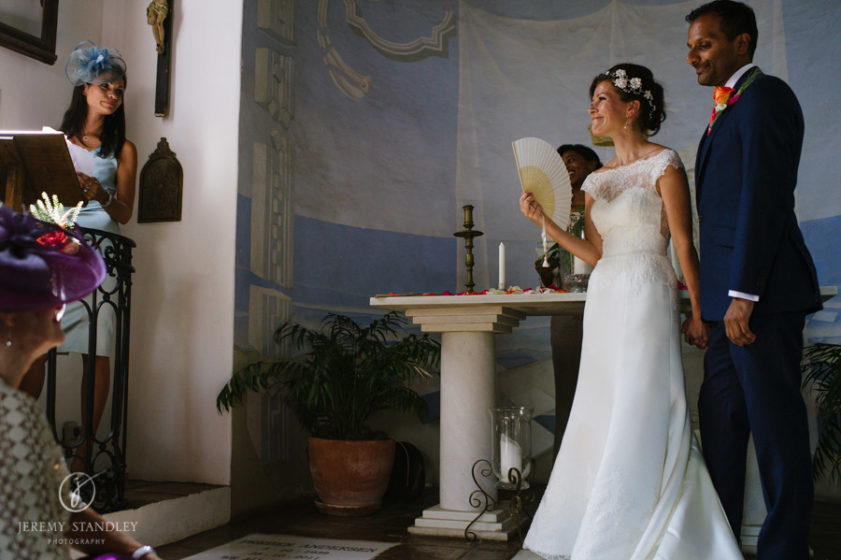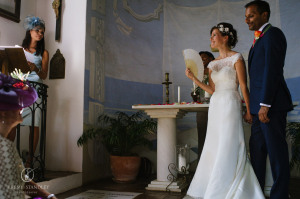
A few weeks ago, Bride Magazine (which I love) re-posted on Twitter an article about bad wedding ideas. Basically, wedding ideas that although may seem like good ideas, in their opinion, they most certainly are not! Along with getting married in a remote, off-the-beaten-track location, one of their other ‘bad’ ideas was asking a friend or relative to conduct your ceremony for you.
Unless the person you ask to officiate your ceremony is already a registrar/officiant or celebrant or someone who works in a similar line of public speaking, then the chances that your ceremony is going to be carried out in a professional, fluid and engaging manner, can be quite slim ones.
However, as much as I am in agreement (to some extent) that asking a friend or family member is potentially a bad idea, I also think that done well, by the best person possible, it can be quite wonderful! And as I know there will be couples out there who couldn’t possibly imagine anyone else doing their ceremony for them, I feel it is better to help people in this situation and make sure they do their ceremony justice. And as I am also an absolute champion of people being married in exactly the way that they want to be, writing this off as a bad idea, without offering some good advice would be very uncharitable of me!
So if you are someone who falls in to this category and really, really, really, really wants to be married by a family member of friends, then here are my top tips for you.
In the UK, only civil registrars can legally marry you, either at a registry office or in an approved and registered venue such as a stately home or hotel. Some religious clergy also have the authorisation to legally register your marriage, too. In the USA, some states allow your chosen person to be registered beforehand, giving them permission to carry out a ceremony and to legally register that ceremony. Every country, every city, wherever in the world will have their own rules and regulations about legal ceremonies. So the point is to never assume that a friend or family member can carry out a legally binding ceremony for you, just because you will be following certain ceremonial guidelines. The best and easiest thing to do, is to take care of the legalities by signing the marriage contract at your local civil registry office or equivalent, which will make you legally married and then continue with what is considered as your ‘true and proper’ ceremony with your friend or family member officiating for you on another day. I have written a tonne about differentiating between a legal and ‘true’ ceremony, so do hop of to this post if you want some more information this.
 Choose the best person that you possibly can
Choose the best person that you possibly can
Obvious. Yes. Easy to do. No. Some people have the wrong idea about what it takes for someone to officiate a ceremony. There is a misconception sometimes that a person who has to stand up and conduct a ceremony in front of hundreds of people (in some cases) must be an extroverted, outgoing person, who naturally feels comfortable and happy to address lots of people. This isn’t the case at all! I know many celebrants who have a very quiet manner and are definitely not the loudest people in the pack but who have lots of confidence and charisma when conducting their ceremonies. And so I think the confusion lies in thinking that confidence and being extroverted are the same thing. They are not. Someone who is too extroverted may lack the professionalism in keeping the ceremony on point and about the couple. Some extroverts do like to talk about themselves a lot or manage to make themselves the centre of attention, even unwittingly. So the key elements that you should look for in your friend or family member should be the following.
- someone who is confident and not easily intimated
- someone with a crisp, clear speaking voice
- someone who can easily engage with people
- someone who is used to speaking in public
I would like to think that the person you choose has all of those qualities. The more of these qualities that they possess, the more likely they will be able to carry out your ceremony for you in a professional way.
You may also want to think about choosing someone who although is close to you, will be able to distance themselves enough to not get emotional when you do or simply to get caught up in the emotion of the whole event, which can be difficult not to do.
No matter what type of wedding ceremony you decide on having, religious or non-religious, it needs to have a structure. Although, many ceremonies will have very different content, they will in theory all follow a pattern or a type of process where certain things happen at certain points, in order to make it sound and feel like a ceremony! The sooner you can get a structure in place, the easier it will be to build your ceremony content around your structure. If you are relying on a friend or relative to conduct your ceremony, then you should be responsible for writing the content or at the least writing it with your chosen person. If you are not using a professional, you need to have the last say on your ceremony structure, style and content.
Below, I have put together a rough outline of a very basic ceremony structure, which is a good starting point for developing your ceremony.
- Processional/ wedding party entrance*
- The welcome and address to the wedding guests*
- Aim of the ceremony/understanding of marriage (optional)
- Reading (optional)
- Symbolic ritual (optional)
- Exchange of vows including any personal vows*
- Exchange of rings*
- Reading (optional)
- Summary of ceremony and closing remarks*
- Declaration of marriage*
- Recessional/ Wedding part exit
I’ll say this now, this is not definitive and can be subject to change depending on what elements you choose to include in your own ceremony. However, as a guide the elements with an asterisk should really flow in that order. This may be stating the obvious, but it would be very strange to see you exchanging rings before you’ve said your vows! Your ring exchange symbolises the sealing of your promises and so should happen after you’ve made those promises! This is why you need to research your ceremony so well, because there is a lot to consider. You are trying to accomplish something that professionals who are trained and experienced do, on a regular basis, and so if you are feeling a little overwhelmed about it all, it’s only normal that you would. There is a lot to take in, however it’s probably best to keep your ceremony as simple as possible, unless you feel confident enough to be able to weave in other elements as a professional celebrant would.
Consider using a professional
If what I have written so far, is starting to make you feel sick and has done nothing to alleviate any worries you may have had about asking a friend or family member to officiate your ceremony, then do consider using a professional. With the most basic level of involvement, you could contract a wedding officiant to write your ceremony for you. So working together, the celebrant will use their normal working methods to put together and shape the ceremony that you want and then write the content of the ceremony for you. Then, your friend or relative already has a perfectly written script, which might need a little rewording by him or her if necessary in order to make it readable to them. So with this option you get the best of both worlds. You get a professional ceremony script that is structured and personalised to suit you, conducted by a friend or relative who is very dear to you.
If you still feel you are struggling with finding the right friend or relative, then perhaps going fully down the professional route is the best option for you. Planning your ceremony shouldn’t be stressful, it should be relaxed, enjoyable and fun and so if there is a danger that those three words are not going to make an appearance any time soon, find yourself a celebrant and put yourselves out of misery. And besides, there are so many easier ways that friends and family can be involved in your ceremony instead of being the person to conduct your ceremony, so maybe these might be an option for you too.
Good luck to you. I’d love to know how it goes!
Have you written your own ceremony or in the process of it? Have you any tips to add?





